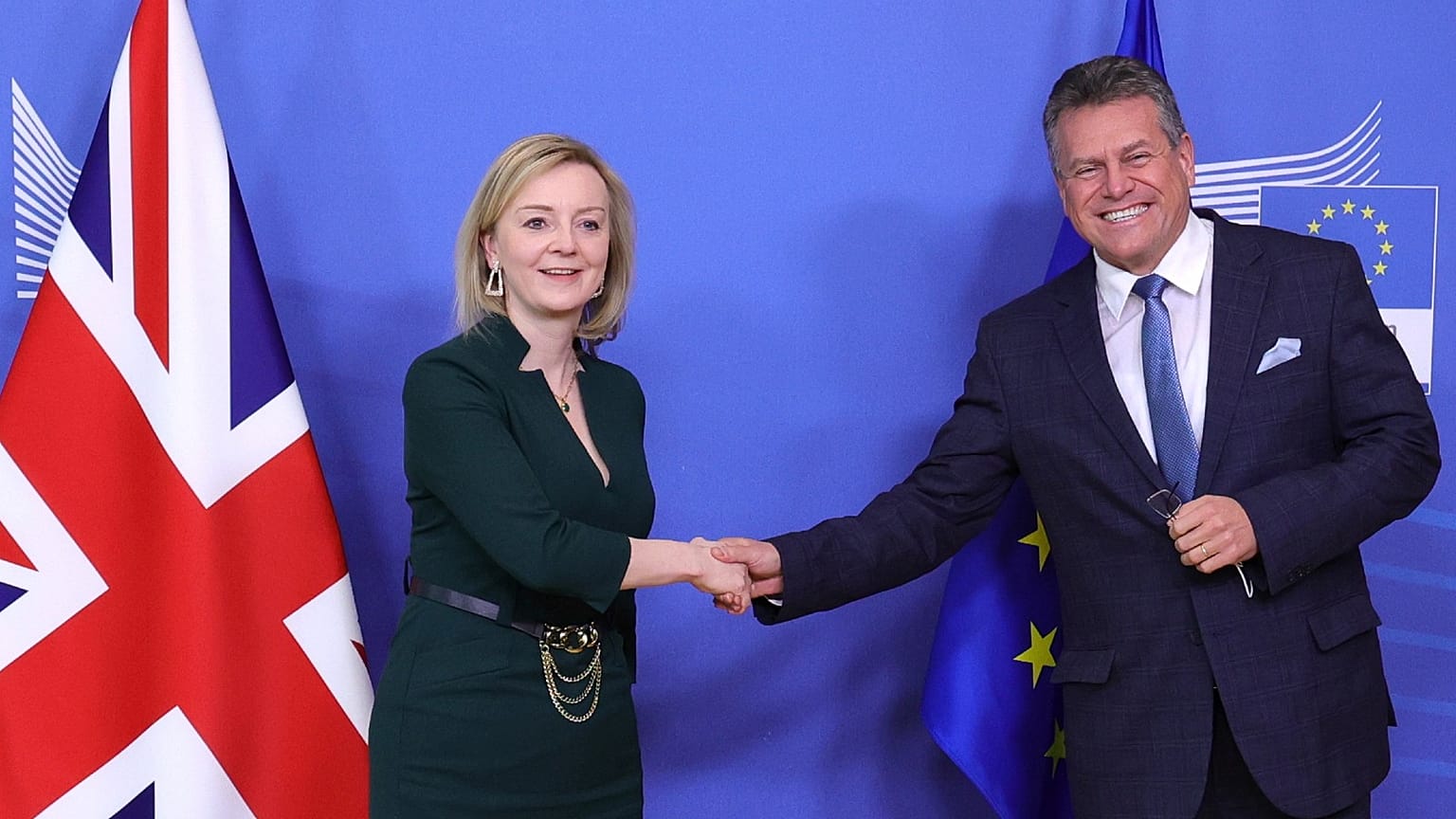The historic vote in Northern Ireland was succeeded by well-rehearsed accusations of inflexibility from both Brussels and London.
Sinn Fein, Northern Ireland's pro-unification party, has for the first time in 101 years won the most seats in the province's parliamentary election, but the impact on Brexit negotiations may be muted, experts have told Euronews.
 ADVERTISEMENT
ADVERTISEMENT
 ADVERTISEMENT
ADVERTISEMENT
The historic vote in Northern Ireland was succeeded by well-rehearsed accusations of intransigence from both European and British officials suggesting the stalemate over the Northern Ireland Protocol remains unchanged.
The British government, via Deputy Prime Minister Dominic Raab, has called for "stability" in Northern Ireland, calling on the various political formations to come together and form an executive. But he also, in the next breath, argued that "it's equally clear that that stability is being put at risk, imperilled if you like, by the problems with the Northern Ireland Protocol."
Brandon Lewis, Britain's Secretary of State for Northern Ireland, stressed meanwhile that "it is really frustrating that the EU have not shown the flexibility we need to see to get that resolution" and that although the UK has for now abstained from triggering Article 16 that would see it unilaterally withdraw from the Protocol, "we've always said we take nothing off the table and that hasn't changed."
This led Maros Sefcovic, the EU's chief negotiator, to riposte that the 27-country bloc has "already shown a lot of flexibility by proposing impactful, durable solutions and we stand ready to continue discussions.
"We need the UK government to dial down rhetoric, be honest about the deal they signed and agree to find solutions within its framework," he added in a statement.
Will a devolved government be formed?
The Protocol remains a painful thorn in EU-UK relations.
London, which negotiated and approved special post-Brexit arrangements keeping Northern Ireland tied to certain rules related to the EU's Single Markets for goods and the Customs Union, is now rejecting it arguing it creates a de-facto border in the Irish Sea.
The talks between the two sides ground to a halt last year with meetings held since then unable to break the deadlock. The last round of talks was held in February.
According to Charles Grant, Director of the Centre for European Reform (CER) think tank, the win by Sinn Fein, which seeks unification with the Republic of Ireland, may turn out to have strengthened the British government's position in the negotiations. This is because it makes it less likely that the DUP will take part in a government, which in turn will lead to a crisis that in the long run could endanger the Good Friday Agreement.
The party, which used to be the mouthpiece of the paramilitary Irish Republican Army (IRA) group, won 27 of the Assembly's 90 seats, ahead of unionists DUP, which garnered 25 seats, and the non-aligned centrist Alliance party, which secured 17 seats.
This means that Michelle O'Neill, Sinn Fein's leader, is expected to become First Minister with the Deputy First Minister role to be filled in by a DUP politician, as dictated by a mandatory power-sharing system created by the 1998 peace agreement that ended decades of Catholic-Protestant conflict.
But the DUP has already announced they will boycott joining a new devolved government unless major changes to the Northern Ireland Protocol are found.
Support for Protocol growing...
Should it act on its threat and trigger a political crisis in the region, the onus could well be on the EU to move the needle, Grant said.
And this is despite the fact that Northern Irish voters are increasingly warming up to the Protocol.
The province voted to stay in the EU in the 2016 referendum and a paper released last week by the UK in a Changing Europe research network, found that a majority of respondents continue to hold a negative view of Brexit. Two-thirds of respondents also believe that Northern Ireland does need special arrangements to manage the effect of the UK's divorce from the bloc.
Negative views of the Protocol are meanwhile slowly thawing with the number of respondents viewing the Protocol as providing appropriate means of managing the effects of Brexit on Northern Ireland or as a good thing for the region, inching over 50%.
The paper highlights though that this is largely due to nationalists and non-aligned -- primarily those who voted against Brexit and are in favour of the Protocol -- becoming even more in favour of it while unionists continue to oppose the Protocol.
For Emily Fitzpatrick, junior policy analyst at the European Policy Centre (EPC), another think tank, this proves the DUP could very well shoot itself in the foot if it does indeed refuse to join the devolved administration.
"If the DUP refuse to re-enter power-sharing arrangements as a result of issues with the Protocol, this could in the short term allow the UK government to point to the Protocol as disrupting politics in Northern Ireland. However, this paralysis is time limited," she told Euronews, with the parties given 24 weeks to find a power-sharing arrangement, failing which another election would be triggered.
"If the DUP continue in their refusal to enter government, their popularity — already suffering — is likely to deteriorate further. This could serve to incentivise the party to re-enter government before the six month period elapses," she went on.
Additionally, the growing support for the Alliance party shows not that a majority of voters want to make the Protocol work but that they want "to move past traditional ‘identity’ politics, in which unionist opposition to the Protocol is enmeshed.
"Such a result adds legitimacy to the Commission’s pragmatic/solutions orientated approach to ongoing discussions. However, the extent to which the UK government attributes the same understanding to the outcome of the vote depends on whether it takes its cues from the will of the Northern Irish population, or Boris Johnson’s political popularity," Fitzpatrick argued.
...but not unconditional
Yet, the EU would also do well not to think that an Assembly controlled by Sinn Fein would rubber-stamp the current Protocol when asked to do so in December 2024, Grant highlighted. Per the Withdrawal Agreement, Northern Irish institutions are to be periodically asked whether they consent to the trading arrangements from the Protocol with the first consent vote to be held in two and half years.
But while Sinn Fein and their voters are not opposed to the Protocol, they would also like it to be improved, according to Grant, in order to facilitate the movement of goods and prevent a repeat of shortages already observed in supermarkets.
A good compromise would be for the EU to agree to a two-speed system with separate customs arrangements for British goods intended for the Northern Irish market and those meant to be transported across the border to the Republic, according to Grant. In exchange, the UK would have to agree to align itself with the EU's phytosanitary standards.
Both would be difficult, mostly for ideological reasons.
Towards an Autumn solution?
Both London and Brussels have repeatedly said they need to find solutions as soon as possible yet informal deadlines have, just as repeatedly, not been respected.
Now, according to Grant, the earliest a possible solution could be found regarding the Protocol is probably in the autumn. That's down to whether Sinn Fein and DUP can work together in a devolved government but also to domestic politics in Westminster.
Prime Minister Boris Johnson could very well have his leadership contested over the next few weeks if the much-awaited report by senior civil servant Sue Gray into rule-breaking parties at Downing Street during COVID-19 lockdowns proves explosive.
All that, of course, depends on whether London will act on its threat to legislate to override parts of the Protocol which would inevitably prompt a furious reaction and retaliatory measures from Brussels.
Some hard-liners in the ruling Conservative Party are relaxed about that prospect, including Minister for Brexit Opportunities and Government Efficiency Jacob Rees-Mogg, but others such as Chancellor Rishi Sunak, are known to oppose steps that could lead to a trade war.
The decision to omit such a law from the upcoming Queen's speech, "shows that the UK is not willing to take directly proactive action just yet," Fitzpatrick said.
"Especially considering the reaction this could draw from the US and in light of calls for unity amongst the West with the war in Ukraine. The above-mentioned 6 month period will provide space for discussions to continue," she went on.
"Overall, the Protocol is something that was being imposed on Northern Ireland following negotiations between the EU and UK. It would be useful for parties to reframe the ongoing talks as a means of finding joint solutions to the legitimate problems people and businesses are facing rather than tit for tat negotiations," she concluded.














